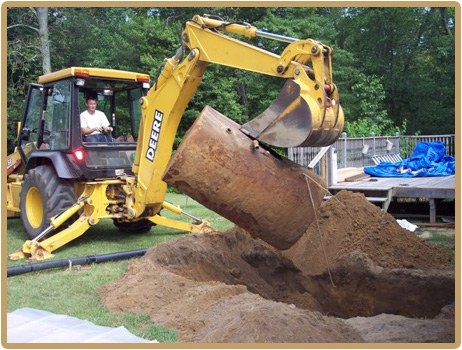Keep in mind that if have an oil tank you need removed, this will most likely be a he only time in your life you will ever have to deal with something like this. Odds are against you making the best decision regarding removing the underground tank, which is why we have devised this handy tank removal reference guide. The following information regarding tank removal are a cumulation of 20 years of tank removal experience and speaking to people who had their tank removed and their decision making regret.
Google oil tank leak and you will see some scary web pages. If you are selling a property with a tank and don't you think it's an issue, realize your buyers are reading these pages and they know an oil tank can be an issue.
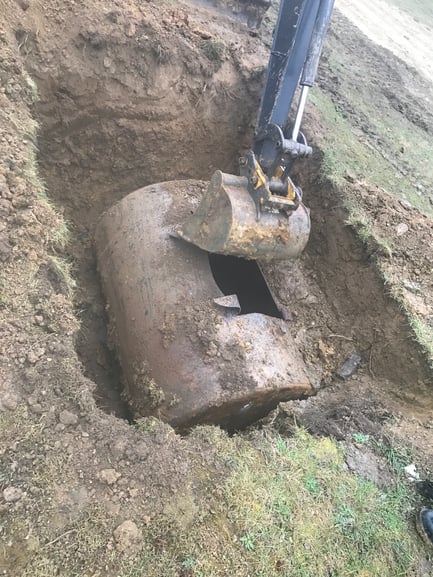
Here are important oil tank removal fact.
- Most oil tanks do not leak.
- Most oil tanks that leak do not require expensive remediation and can be addressed by testing.
- Every state allows a permissible amount of oil to remain in the ground.
Few if any tank removal firms will tell you these facts.
Tank removals while not cheap can cost between $1200.00 and $2,000.00 on average. Remediation of leaking oil tanks can cost $10,000.00, $16,000.00, $40,000.00 dollars or more. Do I have your attention? Many firms will suck you in with a competitive price on tank removal and then whack you with a bill to remediate the leaking oil tank. Many people call our office after their tank is removed and after they get an outrageous proposal to remediate. These tank remediation quotes appear on the same day as tank removal or within a few days and are 90% of the time baseless money grabs.
Google oil tank removal and you will see some slick web pages, not as scary by any means as the tank leak search. These pages have happy people, testimonials and some sales oriented content. You may be swayed by the nice web pages or even that the company is LOCAL. Local has nothing to do with an oil tank removal, you probably have a few pizza shops close by and one is your favorite. Proximity to your property is not like a pizza shop, good environmental companies are not known to be as popular as pizza shops. Contract with these firms and if your tank has any remote evidence of leaking, you will regret your choice of contracting. Here is why.
I had no indication that my tank was leaking and the company I hired agreed.
Big, big trouble is brewing in this sentence. I would hope that no one wishes ill will on anyone, but let us look at an oil tank leak as a possibility based on the following.
Oil tanks do not last forever and on average a tank lifespan is between 20 and 30 years.
Age of tank. If your oil tank is the original oil tank for the house and it is older than 30 years, well it has outlasted the refrigerator, washer, dryer, roof, ect. It is most likely the oldest replaceable fixture in the dwelling that was NEVER REPLACED. So can we agree there is a CHANCE the oil tank maybe leaking? Just a chance. If your answer is yes, well should a brief conversation occur about the oil tank leak scenario? If yes, then the what if my oil tank leaks discussion should be written into your oil tank removal contract, so you know what steps will occur in the event of a leak. Trust me the answer is yes and your proposal like so many we see will not have the language in there and you are setting yourself up for problems.
Soil samples. You do not want them because soil sampling is not required by law, you do not want to test because you do not want to find a problem. I mean who wants to go to the doctor, you know the doctor is going to find something wrong. Soil sampling after a tank is removed is 100% important and not sampling is the biggest mistake you can make.
Remember the google search for oil tank leak? Well how are you going to certify the tank did not without testing? Perhaps you think the township will inspect and certify the tank did not leak? Wrong their job is a construction inspection, remember they are not licensed to remove an oil tank, the company you hired is licensed and they hold the burden to certify the work.
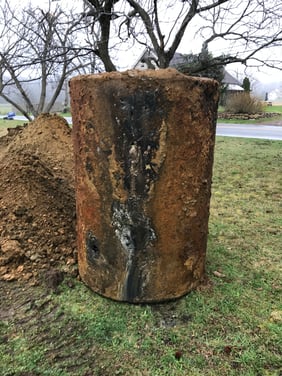
How do we certify that a tank did not leak?
Not by looking at it, believe it or not. No one knows your cholesterol level without blood work, there are marathon runners that have heart disease, healthy looking people get cancer, my point is looks can be deceiving you cannot look at an oil tank and be 100% certain the tank did or did not leak. Please do not tell me you will be able to tell if the tank leaked because you are going to look for black oil in the ground, because everyone knows that is how you can tell, WRONG. The tank is not the Beverly hillbillies, heating oil is not black its dyed red. (Google it, heating oil is red, no lie).
Back to soil testing, hey if you were buying a house with an oil tank that was removed, wouldn't you want testing completed and a report certifying the tank did not leak? If you don't care, leave this web page, go play words with friends, understanding the pitfalls of oil tank removal are not your topic of interest.
Soil testing protects you from unscrupulous tank removal firms that would remove your tank, show you a hole in the tank after removal, show this hole to the construction official, report you to the state and give you a cost to remediate, which is many times more expensive than the tank removal and more profitable for the removal company.
Here is the short story of a property where a tank was removed, the tank was found to be leaking and got a quote
1.Oil tank was removed.
2.Property owner want soil testing.
3. Tank removal company says soil testing is a waste of money.
4. Tank removal company has X-ray vision and can just tell that the tank leak is bad and you need remediation, why test?
5. Owner is told testing is expensive, $5,000.00, true story, owner was told why spend the money to test if you know it leaked?
6. Truth, testing of an oil tank, say a 275 to 550 gallon oil tank would cost under $250.00! Think that money is worth spending?
7. Owner was given a quote to remediate a day after removal.
At this step in the tank removal, the ownerr felt something did not add up. Owner brought in another company to test the removed tank area. Yes contamination was found, but it was with acceptable standards.
Success tank removal depends on testing, if you test, you could save thousands in unnecessary oil tank remediation.
If you don't test the soil after a tank is removed, the removal company can quote you an expensive remediation, good for them, not for you.
Why are we posting oil tank removal problems, showing you how to be a better consumer of these services, well we remove tanks but we also help people who had their tank removed and we are repeating their stories for your education. Unethical tank removal firms give all companies a bad name. To be frank as well, we get a little tired of hearing the same story over and over again.
Common compliants after a tank is removed?
My oil tank contract was based on the tank not leaking. It leaked and I am getting billed alot more than the cost of the removal.
My tank had holes when it was removed and I have to remediate.
My leak was reported to the NJDEP AND NOW I HAVE A CASE NMBER.
The removal company said testing wasn't in my contract so they didn't test.
The removal company said testing was a waste of money and I have to remediate.
Environmental company gives a 10k quote to remediate, my house is under contract for sale and I have to clean up the leak or risk losing the buyer.
We have been involved with more projects than I care to count that fits those details. Sit down before I tell you what we find at these sites.
Close to 80% of the time, we find little to no oil in the ground or we find that oil levels are within acceptable levels, meaning no expensive remediation.
The other 20% of the time, well yes, remediation was necessary but sadly, not to the extent they were quoted.
Do you have questions we didnt answer? Common oil tank question and answer can be found at Residential Heating Oil Underground Storage Tanks (USTs) Frequently Asked Questions (FAQs)
Want to speak to a live person call up MOnday to FRiday 8:00 am to 5:30 pm Esatern Standard time at 856-858-9509
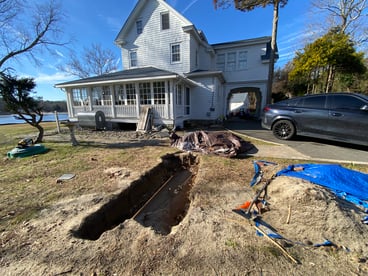
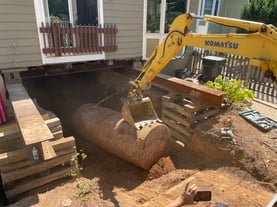 This brings us to today why should anyone be concerned about an oil tank, oil comes from the ground. Well, New Jersey has no past or present drilled oil wells, we are not an oil-rich state, simply put oil is not naturally present in the ground in New Jersey. What we are burdened with are regulations. Yes, there are regulations governing oil tanks. The most broad-reaching regulation is the Spill Act from the 1970s which says any release of a contaminant to the environment is reportable to the New Jersey Department of Environmental Protection (NJDEP). On top of this law are regulations that dictate what amount of oil is permissible and what is not. Levels above what is permissible require what is known as remediation. Other laws are construction defining what you must do to a tank when you remove it from service (either remove it or clean and abandon it in place). You are also burdened with the definition of a Responsible Party (RP). An RP is kind of like a store policy that says you break it you buy it. In terms of an oil tank that leaks and requires remediation, well if you own a property or buy a property with an oil tank that leaks, well you are responsible for addressing it, hence the Responsible Party term. This is why home buyers are wary of oil tanks. This is why homeowners selling a property with an oil tank have problems, nobody wants to have the financial burden of cleaning up an oil tank leak. Let me add another layer to this, banks, and mortgage companies are wary of providing financing for a home purchase if an oil tank was or may present. Oil contamination can and has devalued homes, somewhere it makes sense for homeowners to walk away from the mortgage, leaving the bank with the problem.
This brings us to today why should anyone be concerned about an oil tank, oil comes from the ground. Well, New Jersey has no past or present drilled oil wells, we are not an oil-rich state, simply put oil is not naturally present in the ground in New Jersey. What we are burdened with are regulations. Yes, there are regulations governing oil tanks. The most broad-reaching regulation is the Spill Act from the 1970s which says any release of a contaminant to the environment is reportable to the New Jersey Department of Environmental Protection (NJDEP). On top of this law are regulations that dictate what amount of oil is permissible and what is not. Levels above what is permissible require what is known as remediation. Other laws are construction defining what you must do to a tank when you remove it from service (either remove it or clean and abandon it in place). You are also burdened with the definition of a Responsible Party (RP). An RP is kind of like a store policy that says you break it you buy it. In terms of an oil tank that leaks and requires remediation, well if you own a property or buy a property with an oil tank that leaks, well you are responsible for addressing it, hence the Responsible Party term. This is why home buyers are wary of oil tanks. This is why homeowners selling a property with an oil tank have problems, nobody wants to have the financial burden of cleaning up an oil tank leak. Let me add another layer to this, banks, and mortgage companies are wary of providing financing for a home purchase if an oil tank was or may present. Oil contamination can and has devalued homes, somewhere it makes sense for homeowners to walk away from the mortgage, leaving the bank with the problem. 




